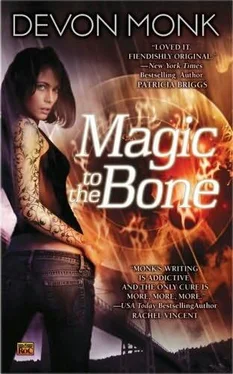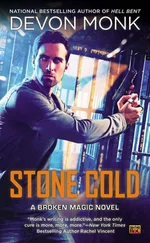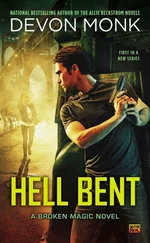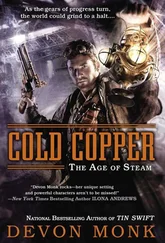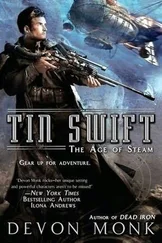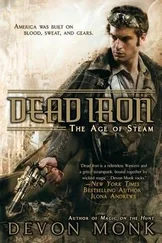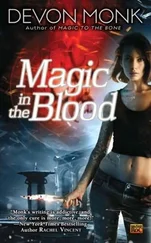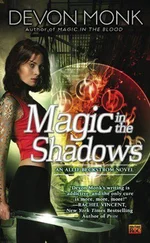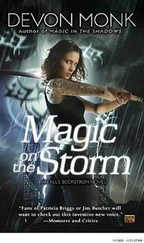The wind changed, and I got a strong whiff of the sewage treatment plant and the stink of the river.
Great. Rotten fish, garbage, and sewage. I was such a lucky girl. But I couldn’t handle being on the street right now. I felt too exposed. I needed to hide my scent, then find a phone.
I followed the alley to another street, one that paralleled the river, and jogged along it, heading toward the gothic spires of the St. John’s Bridge and Cathedral Park nestled along its feet.
There had to be a way down to the water from here. This was one of the older parts of town, and the river was still used for shipping and other industrial things. I shivered, even though I was starting to sweat, and flipped up the hood on Zayvion’s jacket. I took the next street that led down toward the river. I felt ridiculously exposed walking alongside warehouses and rusted chain-link fences and empty gravel lots. But I didn’t see anyone following me. Cars drove past, tires hissing against the wet street, and I kept my head low, hidden by my hood. Bonnie could be in one of those cars. Bonnie and her gun.
I hurried.
Finally, I saw the shieldlike concrete bases of the St. John’s Bridge marching down to the river’s edge, green metal cables connecting the spires of the suspension bridge to the earth. I headed to the parking lot, and quickly toward the sparse shelter of bare-branched trees that lined the river. The river smells would be down there, past the grassy field, past the meandering concrete walkways and park benches, behind the screen of brambles and trees. I didn’t know if there was a real footpath to the shore, and even if there was, didn’t want to take time looking for it.
I jogged along the concrete path, parallel to the river. The brambles thinned out here, not exactly an opening, but maybe a way down.
A car pulled into the parking lot behind me, cruising along the edge, low engine idling, headlights flickering against the rain.
Shit.
I pushed through the wet brush and picked my way down the tumble of rough rocks to the narrow sand-and-gravel shore.
Holy hells, it stank of garbage and raw sewage. I covered my nose and mouth, trying not to gag.
Even though it had been raining, the Willamette River was still low. The shore was covered in garbage and punctured by the remnants of old docks, or maybe piers. Wooden spikes as big around as me speared up through the sand and gravel, catching and holding piles of filth. Half-buried concrete pilings tipped in drunken angles like forgotten headstones. The hiss and snap of the river’s small waves blended with the clattering noise of rain, but didn’t mask the drone of traffic crossing the bridge twenty stories above me.
Across the river I could make out the lights of warehouses, cranes, and silos all set against the evergreen hills. There were more industrial areas on this side of the river too, but they were up a ways toward where the Columbia met with the Willamette.
The twin red lights on the railroad bridge marked the boundary between the rest of the city and this neighborhood. If I followed the edge of the shore I could come up somewhere deeper in the city without traveling by road. That would get me into town without being seen or scented, and from there, so long as Bonnie wasn’t on my heels, I’d find someplace to call the cops and lie low until a patrol car came to get me.
I moved as quickly as I could over the rocks and slime and slippery chunks of trash. It looked like the entire neighborhood kept its garbage bill down by dumping here. Seagulls and crows picked through it, screeching and scrabbling. Most of the trash had fallen close to the land, but broken bags of refuse lay like a putrid avalanche, strewn from the brushy edge of the cliff down to the lapping water.
All the better for Bonnie not to smell me, I reminded myself. My shoes and jeans were covered by a wet slime that stank like the bottom of a hospital’s Dumpster. I worked my way up a little closer to the cliff, hoping to stay out of sight and a little drier. It also meant getting cozy with the garbage, but I was all for stinking if it meant staying unshot.
The rocks got bigger here, and so did the stumps of old trees and mounds of garbage. This did not bode well for easy or quick footing.
I clambered along as quickly as I could, glancing frequently toward the railroad bridge to gauge my progress.
A pile of garbage to my left rustled and something small skittered out from it.
Probably a rat.
Neat.
I took another step, keeping my eye out for the rat, and saw instead a small, gray kitten nuzzling the hand of a dead man.
Good loves. Could this day get any better?
I am not a cat person. Not that I hate cats or anything. It’s just that I have not been around them much, as my father never allowed pets in my life. I developed a sort of cautious distance from all things four-footed. Especially cats, with their curiously intelligent eyes and sleek, unpredictable motions.
But this little guy was hardly moving and his eyes were closed. He mewed, a tiny, pitiful sound. What was I supposed to do? Leave the poor thing there? Even if all I did was drop him off at a shop or on the street as I ran through town, he might have a better chance of surviving. Maybe someone at the police department could get him to a shelter or something. He was so small; if I left him here, a seagull would eat him for lunch.
Of course, there was the complication of the dead body next to him, and if there was one category I needed less of right now, it was “ten interesting things I don’t want to tell the cops about,” dead bodies being right up there at the top of the list.
Move on, Allie, I thought. Can’t save every little thing in the world.
I took another step and the wind changed, lifting the sulfur and rotten garlic smell of a magical Offload from the mess at my feet. The kitten? Who would use a kitten as a Proxy? Maybe the dead joker next to him.
This was so none of my business.
While I am not a cat person, I am even less a dead-body person. But it’s not like I hadn’t ever been to a funeral before. I could handle seeing dead people. I didn’t much like touching them, but in order to get the kitten out from under his arm, and maybe then to a shelter, or at least away from the dead jerk, I had to move the dead arm.
I took a deeper breath and bent down. I plucked at the dead jerk’s sleeve and tried lifting the arm, which was heavier than I’d expected. Deadweight. Ha.
Not funny.
I couldn’t get good enough leverage, so I took hold of the jerk’s wrist.
Warm wrist. Supple wrist. Alive wrist.
Quite clearly alive, or at least I sure as hell hoped so, because he moaned.
The kitten mewed and I yelped, which, I suppose, was better than the scream I’d felt like belting out.
Hells. Double hells. A dying person was a lot more of a problem than a dead one. I glanced back down the beach. A wall of gray rain blocked my view. I looked up the shore, and got the same—rain.
I wiped my face with the hand that hadn’t touched the not-dead guy and bent over again to get a closer look.
He was lying on his stomach and just half of his face was visible. He looked younger than me, and had narrow features leaning toward delicate. He reminded me of a boy who played violin down the street from me when I was ten. His skin was the color of fog and rain, and his lips were blue. Not dead yet, but not much alive either, I decided.
Thinking about back and neck injuries, and the inadvisability of moving someone who was hurt, I gently pushed him over onto his back anyway.
Thin. Malnourished, and bleeding from somewhere under his shirt.
I tugged his sweatshirt up, and hissed at the gash in his chest.
Someone had gone all stab-happy on him, and recently. The wound oozed a little, but wasn’t gushing, which didn’t make sense until I placed my finger at the edge of one of the puncture marks.
Читать дальше
